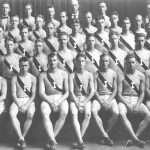FLASHBACK: Illinois Captures First-Ever NCAA Championship in 1921

CHICAGO – The University of Chicago has its place in history secured.
From its early beginnings in 1890, thanks to a $400,000 matching donation from famed oil magnate John D. Rockefeller and land donated by retail giant Marshall Field, the school, located eight miles south of the city’s famed Loop, has grown to become one of the most prestigious institutions of higher learning in the world.
The campus was also the site of the first man-made self-sustaining nuclear chain reaction conducted by Enrico Fermi on Dec. 2, 1942 at the school.
Its place in athletics history is also firmly entrenched.
The home of legendary coach Amos Alonzo Stagg, who spent four decades coaching the Maroons in football, basketball, baseball and track, the school was one of the early powerhouses in the Western Conference, which has become known today as the Big Ten Conference.
The school also produced Jay Berwanger, the first person to win the prestigious Heisman Trophy as the nation’s top collegiate football player.
For two days in 1921 the campus, considered to be one of the most picturesque in America, was front and center as the nation’s top collegiate track and field athletes gathered to compete in the NCAA national championship meet.
Stagg Field, which opened in 1893 as Marshall Field, had been renamed Stagg Field in 1913 in honor of the already-legendary coaching figure.
It was the first national championship ever sponsored by the NCAA in any sport. It remains one of the best attended events sanctioned by the NCAA each year.
This year’s meet, the 100th anniversary of that first conglomeration of the nation’s best thinclads, will be held June 9-12 at Hayward Field in Eugene, Ore.

Despite not winning any individual championships at the meet, the University of Illinois came away with the team title. The Fighting Illini, coached by Harry Gill, scored 20.25 points and finished 3.5 points ahead of Notre Dame, which tallied 16.75 points in the two-day event. Iowa (14), Washington (12.25) and Wisconsin (10) rounded out the top five teams. Host Chicago finished with five points and the Maroons’ Charles Redmon gave Chicago its first-ever NCAA champion when he topped the field in the hammer throw with a toss of 133-feet, nine and three-quarters inches.
The meet, held on two typical hot, humid days in the nation’s Heartland, saw several outstanding performances.
Dartmouth standout Earl Thompson won the 120-yard high hurdles in a time of 14.4 seconds.
That time equaled the clocking Thomson posted one year earlier to establish a new world record in the event. That 14.4 record would remain in place until broken in 1931.
Thomson, who began his collegiate career at Southern Cal before transferring to Dartmouth, was ruled ineligible to compete for the United States at the 1920 Summer Olympic Games in Antwerp because of his Canadian citizenship. He would go on to compete for his native Canada at the Games and would later coach the track team at the U.S. Naval Academy for 36 years.
Washington’s Gus Pope was the lone double-winner in the meet and was the individual points leader. He won the discus with a throw of 142-2 ¼ and topped the field in the weight throw with a heave of 45-4 ½ to score 10 points for the Huskies.
Second-place Notre Dame got individual championships from Gus Desch and Johnny Murphy. Desch won the 220-yard low hurdles in a time of 24.8 seconds while Murphy jumped 6-feet, three-inches to claim the high jump crown.
Gill, the Illinois coach, was also one of track and field’s earliest entrepreneurs. He established Gill Athletics, which remains the sports’ premier manufacturer of track and field equipment.

Team Standings
1 – Illinois 20 ¼
2 – Notre Dame 16 ¾
3 – Iowa 14
4 – Washington 12 ¼
5 – Wisconsin 10
6 – Nebraska 8
7 – Grinnell 7
8 – Northwestern 6
Ohio State 6
10 – Iowa State 5 ½
Event Champions
100: Leonard Paulu, Grinnell (10.00)
220: Eric Wilson, Iowa (22.6)
440: Frank Shea, Pittsburgh (49.00)
880: Earl Eby, Penn (1:57.4)
Mile: Ray Watson, Kansas State (4:23.4)
Two Mile: John Romig, Penn State (9:31.00)
120 High Hurdles: Earl Thomson, Dartmouth (14.4)
220 Low Hurdles: Gus Desch, Notre Dame (24.8)
Discus: Gus Pope, Washington (142-2 ¼)
Hammer: Charles Redmon, Chicago (133-9 ¾)
High Jump: Johnny Murphy, Notre Dame (6-3)
Javelin: Flint Hanner, Stanford (191-2 ¼)
Long Jump: Gaylord Stinchcomb, Ohio State (23-3 3/8)
Pole Vault: Longino Welch, Georgia Tech (12-0)
Weight Throw: Gus Pope, Washington (45-4 ½)

A native of Bismarck, N.D., Ray is a graduate of North Dakota State University where he began studying athletic training and served as a student trainer for several Bison teams including swimming, wrestling and baseball and was a trainer at the 1979 NCAA national track and field championship meet at the University of Illinois. Ray later worked in the sports information office at NDSU. Following his graduation from NDSU he spent five years in the sports information office at Missouri Western State University and one year in the sports information at Georgia Tech. He has nearly 40 years of writing experience as a sports editor at several newspapers and has received numerous awards for his writing over the years. A noted sports historian, Ray is currently an assistant editor at Amateur Wrestling News.
